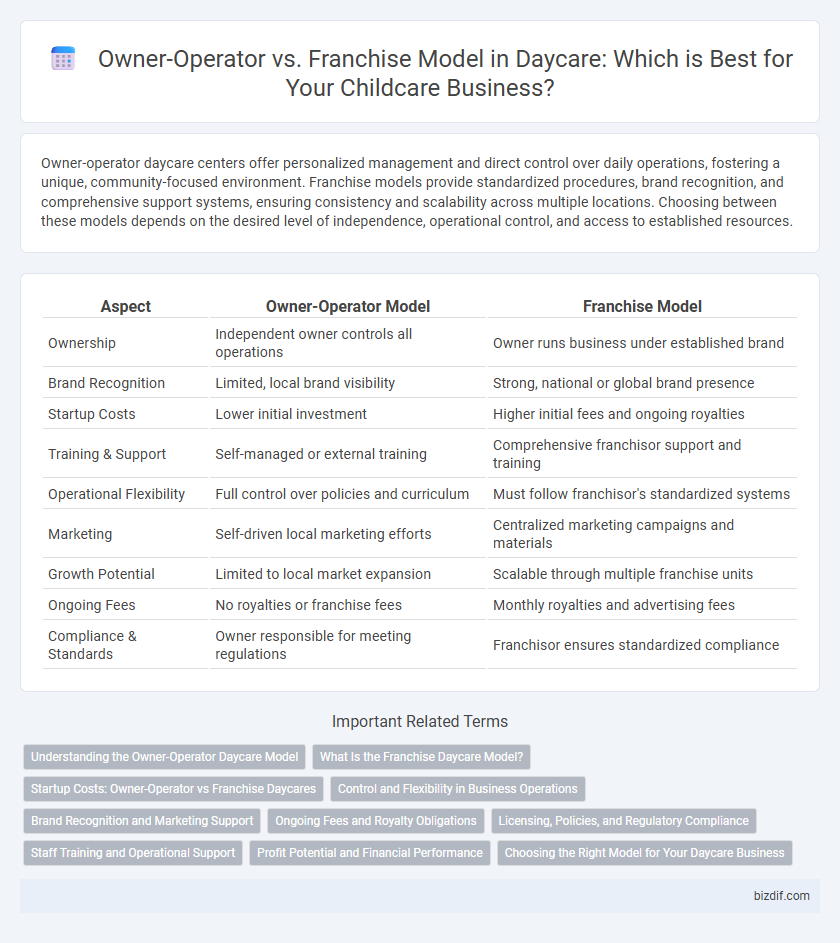Owner-operator daycare centers offer personalized management and direct control over daily operations, fostering a unique, community-focused environment. Franchise models provide standardized procedures, brand recognition, and comprehensive support systems, ensuring consistency and scalability across multiple locations. Choosing between these models depends on the desired level of independence, operational control, and access to established resources.
Table of Comparison
| Aspect | Owner-Operator Model | Franchise Model |
|---|---|---|
| Ownership | Independent owner controls all operations | Owner runs business under established brand |
| Brand Recognition | Limited, local brand visibility | Strong, national or global brand presence |
| Startup Costs | Lower initial investment | Higher initial fees and ongoing royalties |
| Training & Support | Self-managed or external training | Comprehensive franchisor support and training |
| Operational Flexibility | Full control over policies and curriculum | Must follow franchisor's standardized systems |
| Marketing | Self-driven local marketing efforts | Centralized marketing campaigns and materials |
| Growth Potential | Limited to local market expansion | Scalable through multiple franchise units |
| Ongoing Fees | No royalties or franchise fees | Monthly royalties and advertising fees |
| Compliance & Standards | Owner responsible for meeting regulations | Franchisor ensures standardized compliance |
Understanding the Owner-Operator Daycare Model
The owner-operator daycare model emphasizes direct management and hands-on involvement by the individual who owns the business, ensuring personalized care and tailored educational programs. This model fosters stronger community relationships and allows for greater flexibility in decision-making compared to franchise operations. Financially, owner-operators retain full profit control but bear all operational risks and responsibilities independently.
What Is the Franchise Daycare Model?
The franchise daycare model involves investing in an established brand with a proven business system, offering standardized curricula, marketing support, and operational training. Franchisees benefit from national brand recognition, ongoing support, and reduced risk compared to independent owner-operator centers. This model requires adherence to franchisor guidelines but allows faster market entry and scalability within the daycare industry.
Startup Costs: Owner-Operator vs Franchise Daycares
Startup costs for owner-operator daycares typically range from $20,000 to $100,000, influenced by location, space, and licensing requirements. Franchise daycares often require initial fees between $50,000 and $150,000, plus ongoing royalties and advertising contributions. Owner-operator models offer more control over expenses, while franchises provide brand recognition and support at a higher upfront investment.
Control and Flexibility in Business Operations
Owner-operators maintain full control over daily daycare operations, allowing for personalized decision-making and flexible adaptation to local market needs. Franchise models often impose standardized procedures and brand guidelines, limiting flexibility but providing established operational support and marketing resources. This trade-off between autonomy and systematized support is crucial when choosing a business structure for daycare services.
Brand Recognition and Marketing Support
Franchise daycare models offer strong brand recognition and comprehensive marketing support, leveraging established trust and advertising resources to attract clients efficiently. Owner-operators manage independent daycare centers, facing challenges in building brand presence and executing effective marketing campaigns without centralized backing. Choosing a franchise model accelerates client acquisition through proven branding strategies, while owner-operators rely heavily on local marketing efforts and personalized service to grow their reputation.
Ongoing Fees and Royalty Obligations
Owner-operator daycare centers typically incur lower ongoing fees and avoid royalty obligations, allowing for greater profit retention and operational flexibility. In contrast, franchise models require consistent royalty payments and franchise fees, which can significantly impact monthly revenue but provide brand recognition and corporate support. Understanding these financial commitments is crucial for daycare entrepreneurs to align their business model with long-term financial goals.
Licensing, Policies, and Regulatory Compliance
Owner-operator daycare centers maintain direct control over licensing processes and compliance with local regulations, allowing for customized policies tailored to their specific community needs. Franchise models offer standardized licensing support and established regulatory frameworks, but require adherence to corporate policies that may limit flexibility. Understanding the differences in regulatory oversight is crucial for ensuring daycare operations meet state and federal childcare standards effectively.
Staff Training and Operational Support
Owner-operator daycare centers often customize staff training programs to align closely with their unique educational philosophies, fostering personalized operational support. Franchise models provide standardized training modules and robust operational frameworks designed to ensure consistency and regulatory compliance across multiple locations. Access to comprehensive support systems in franchises enables quicker problem resolution and scalability compared to independent owner-operators.
Profit Potential and Financial Performance
Owner-operator daycare models often experience higher profit potential due to lower initial franchise fees and more direct control over operational costs, which can lead to enhanced financial performance. Franchise models provide brand recognition and proven business systems but require consistent royalty payments and adherence to corporate guidelines, impacting net profitability. Analyzing localized market demand and operational efficiency is critical in maximizing revenue and sustaining cash flow within both structures.
Choosing the Right Model for Your Daycare Business
Selecting the ideal business model for a daycare hinges on balancing control and support: owner-operators maintain full autonomy over operations and curriculum customization while shouldering all financial risks and responsibilities. Franchise models offer established branding, marketing assistance, and proven business systems, which can accelerate growth and reduce startup challenges but require adherence to franchisor guidelines and royalty fees. Consider local market conditions, available capital, and long-term business goals to determine whether independent ownership or franchising aligns best with your daycare vision.
Owner-operator vs Franchise model Infographic

 bizdif.com
bizdif.com